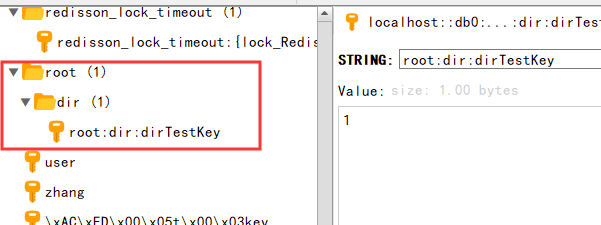RedisTemplate操作命令 - 环境
不断记录中...
SpringBoot整合redis
pom依赖:

<dependency>
<groupId>org.springframework.boot</groupId>
<artifactId>spring-boot-starter-data-redis</artifactId>
<version>2.1.6.RELEASE</version>
</dependency>
<dependency>
<groupId>org.redisson</groupId>
<artifactId>redisson</artifactId>
<version>3.11.2</version>
</dependency>
这里用redisson,因为项目中用了redisson做分布式锁。
配置(application-dev.yml):
spring:
application:
name: product-web
redis:
#数据库索引
database: 0
host: 127.0.0.1
port: 6379
password: ******
jedis:
pool:
#最大连接数
max-active: 500
#最大空闲
max-idle: 1000
#最小空闲
min-idle: 4
max-wait: 6000ms
例 说明:
@Autowired RedisTemplate redisTemplate;
@Autowired StringRedisTemplate stringRedisTemplate;
redisTemplate.opsForValue().set(key, value);
redisTemplate.delete(key);
public void set(byte[] key, byte[] value) {
if (key != null) {
this.redisTemplate.opsForValue().set(key, value);
}
}
redis文件夹形式:
以:做key的分割线可设置归类(文件夹形式)
@Test public void distoryTest(){ String root = "root"; String path = "dir"; String key = "dirTestKey"; redisTemplate.opsForValue().set(root+":"+path+":"+key, "1"); }
显示形式:

RedisClient,引用并封装了上面两个redisTemplate,可以直接执行get、set类似操作

import com.qulv.vdn.common.constant.ConfigConstant; import lombok.extern.slf4j.Slf4j; import org.apache.commons.lang3.StringUtils; import org.springframework.beans.factory.annotation.Autowired; import org.springframework.data.redis.core.*; import org.springframework.stereotype.Component; import javax.annotation.Resource; import java.io.IOException; import java.util.*; import java.util.concurrent.TimeUnit; @SuppressWarnings("ALL") @Slf4j @Component("redisClient") public class RedisClient { public static final long DEFAULT_EXPIRE = 86400L; public static final long NOT_EXPIRE = -1L; @Autowired RedisTemplate redisTemplate; @Autowired StringRedisTemplate stringRedisTemplate; @Resource(name = "stringRedisTemplate") private ValueOperations<String, String> valueOperations; @Resource(name = "stringRedisTemplate") private HashOperations<String, String, String> hashOperations; public void del(String key) { if (this.exists(key)) { this.stringRedisTemplate.delete(key); } } public void set(String key, String value, long liveTime) { if (!StringUtils.isBlank(key)) { this.valueOperations.set(key, value); if (liveTime != NOT_EXPIRE) { this.stringRedisTemplate.expire(key, liveTime, TimeUnit.SECONDS); } } } public void set(String key, String value) { this.set(key, value, NOT_EXPIRE); } public void set(byte[] key, byte[] value) { if (key != null) { this.redisTemplate.opsForValue().set(key, value); } } public Set<String> scan(String pattern) throws Exception{ return ConfigConstant.OPEN_REDIS_CLUSTER_NO.equals("false") ? (Set)this.stringRedisTemplate.execute((RedisCallback<Set>) connection -> { Cursor<byte[]> cursor = null; Set<String> set = new HashSet<>(); try { cursor = connection.scan(ScanOptions.scanOptions().count(2147483647L).match(pattern).build()); while(cursor.hasNext()) { String element = new String((byte[])cursor.next()); set.add(element); } Set<String> var16 = set; return set; } catch (Exception var14) { log.error("【[redisClient]使用scan出现异常,异常原因={}】", var14.getMessage()); } finally { if (cursor != null) { try { cursor.close(); } catch (IOException var13) { log.error("【[redisClient]关闭游标异常,异常原因={}】", var13.getMessage()); } } } return null; }) : this.keysCluster(pattern); } public String get(String key) { if (StringUtils.isBlank(key)) { return null; } else { return this.stringRedisTemplate.opsForValue().get(key) == null ? null : this.stringRedisTemplate.opsForValue().get(key).toString(); } } public Set<String> keysCluster(String pattern) { Set<String> result = new HashSet(); Set<String> nodesSet = this.getClusterNodes(); return (Set)(nodesSet == null && nodesSet.size() == 0 ? result : (Set)this.stringRedisTemplate.execute((RedisCallback<Set>)connection -> { Iterator iterator = nodesSet.iterator(); while(iterator.hasNext()) { byte[] args1 = pattern.getBytes(); byte[] args2 = ((String)iterator.next()).getBytes(); ArrayList object = (ArrayList)connection.execute("keys", new byte[][]{args1, args2}); Iterator it = object.iterator(); while(it.hasNext()) { String keyName = new String((byte[])it.next()); result.add(keyName); } } return result; })); } public Set<String> getClusterNodes() { return (Set)this.stringRedisTemplate.execute((RedisCallback<Set>)connection -> { Set<String> nodes = new HashSet(); byte[] args1 = "nodes".getBytes(); byte[] object = (byte[])((byte[])connection.execute("cluster", new byte[][]{args1})); if (object == null) { return null; } else { String string = new String(object); if (StringUtils.isEmpty(string)) { return null; } else { String[] nodeInfoArray = string.split("\n"); for(int i = 0; i < nodeInfoArray.length; ++i) { if (nodeInfoArray[i].contains("master")) { String[] nodeInfo = nodeInfoArray[i].split(" "); String nodeName = nodeInfo[0]; nodes.add(nodeName); } } return nodes; } } }); } public void updateCmdStatus(String uin, String userName, String cmdId, String status) { if (cmdId != null) { this.set(uin + ":cmdId:" + userName + ":" + cmdId, status, DEFAULT_EXPIRE); } } public String getCmdIdStatus(String uin, String userName, String cmdId) { return this.get(uin + ":cmdId:" + userName + ":" + cmdId); } public void expire(String key, long liveTime) { stringRedisTemplate.expire(key, liveTime, TimeUnit.SECONDS); } public Set<String> keys(String pattern) { return this.stringRedisTemplate.keys(pattern); } public boolean exists(String key) { return this.stringRedisTemplate.hasKey(key); } public void lpush(String key, String value) { this.stringRedisTemplate.opsForList().leftPush(key, value); } public void rpush(String key, String value) { this.stringRedisTemplate.opsForList().rightPush(key, value); } public Long llen(String key) { return this.stringRedisTemplate.opsForList().size(key); } public String lindex(String key, Long index) { return this.stringRedisTemplate.opsForList().index(key, index) == null ? null : this.stringRedisTemplate.opsForList().index(key, index).toString(); } public String lpop(String key) { try { return this.stringRedisTemplate.opsForList().leftPop(key).toString(); } catch (NullPointerException n) { //throw new NullPointerException(" opsForList is null "); return null; } } public List<String> lrange(String key, long start, long end) { return this.stringRedisTemplate.opsForList().range(key, start, end); } public void hset(String key, String field, String value) { this.hset(key, field, value, NOT_EXPIRE); } public void hset(String key, String field, String value, long liveTime) { if (!StringUtils.isBlank(key)) { hashOperations.put(key, field, value); if (liveTime != NOT_EXPIRE) { this.stringRedisTemplate.expire(key, liveTime, TimeUnit.SECONDS); } } } public void hsetAll(String key, Map<String, String> m, long liveTime) { if (!StringUtils.isBlank(key)) { hashOperations.putAll(key, m); if (liveTime != NOT_EXPIRE) { this.stringRedisTemplate.expire(key, liveTime, TimeUnit.SECONDS); } } } public void hsetAll(String key, Map<String, String> m) { this.hsetAll(key, m, NOT_EXPIRE); } public String hget(String key, String field) { return this.stringRedisTemplate.opsForHash().get(key, field) == null ? null : this.stringRedisTemplate.opsForHash().get(key, field).toString(); } public void hdel(String key, String field) { this.stringRedisTemplate.opsForHash().delete(key, new Object[]{field}); } public Map<String, String> hgetall(String key) { return this.hashOperations.entries(key); } public boolean hasKey(String key, String field) { return this.stringRedisTemplate.opsForHash().hasKey(key, field); } public void hasInc(String key, String hashKey, long delta){ stringRedisTemplate.opsForHash().increment(key, hashKey, delta); } public Set zrang(String key, Long start, Long stop) { return this.stringRedisTemplate.opsForZSet().range(key, start, stop); } public Set zrangeByScore(String key, double v1, double l1) { return this.stringRedisTemplate.opsForZSet().rangeByScore(key, v1, l1); } public void zremrangeByScore(String key, double v1, double l1) { this.stringRedisTemplate.opsForZSet().removeRangeByScore(key, v1, l1); } public void zadd(String key, String value, Long score) { this.stringRedisTemplate.opsForZSet().add(key, value, (double)score); } public void zaddlive(String key, String value, Long score, long liveTime) { this.stringRedisTemplate.opsForZSet().add(key, value, (double)score); this.stringRedisTemplate.expire(key, liveTime, TimeUnit.SECONDS); } public void zremoveRange(String key, Long start, Long stop) { this.stringRedisTemplate.opsForZSet().removeRange(key, start, stop); } public void saveMessage(String uin, String userName, String msgId, String message) { this.hset(uin + ":message:" + userName, msgId, message); } public Set<String> getRedisMessageRecord(String uin, String wechatUserName, String wechatContactUserName) { Set messageSet = null; try { messageSet = this.stringRedisTemplate.opsForZSet().reverseRange(uin + ":messageRecord:" + wechatUserName + ":" + wechatContactUserName, 0L, 30L); } catch (Exception var6) { var6.printStackTrace(); } return messageSet; } }
使用示例:
/** * 设置邀请码 * @param user */ public String setInvitationCode(User user){ if (user.getUserId() == 1){ return ""; } else { String code = UUIDUtil.getInvitationCode(user.getUserId()) ; Set<String> keys = redisClient.keys("*#"+user.getUserId()); if (keys.isEmpty()){ //设置代理人相关信息 redisClient.set(code + "_vest_in", getAgentVestIn(user), 60 * 24 * 15); redisClient.set(code, String.valueOf(user.getUserId()), 60 * 24 * 15); user.setInviteCode(code); }else { code = keys.stream().findFirst().get(); } return code; } }
posted on 2019-12-13 11:10 GhostSugar 阅读(2940) 评论(0) 编辑 收藏 举报



